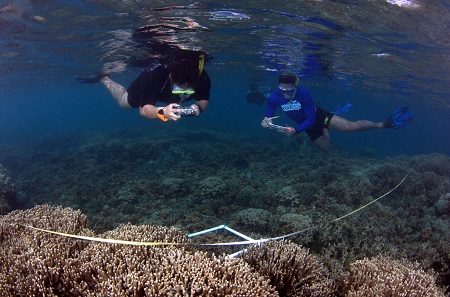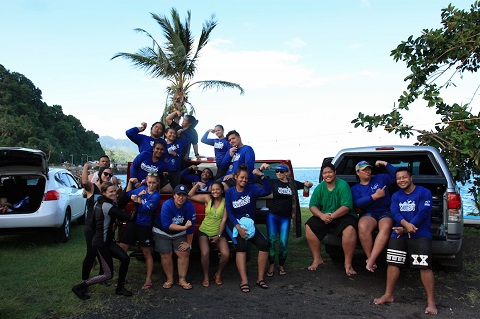
QUEST students Faith Latu (right) and Alphina Liusamoa (left) conduct a benthic survey by collecting photoquadrats and visual estimation as a staff member looks on.

QUEST students and staff pose for a photo after a successful day of reef fish surveys in the water.

QUEST students Faith Latu (right) and Alphina Liusamoa (left) conduct a benthic survey by collecting photoquadrats and visual estimation as a staff member looks on.
ASCC Marine Science QUEST Program Trains Future Coral Reef Managers
March 20, 2018
By Kelley Anderson Tagarino, ASCC-ACNR & Hawai‘i Sea Grant
How are American Samoa’s coral reefs doing? With coral (amu) bleaching in the news so often, and American Samoa’s reefs featured in the documentary “Chasing Coral”, many American Samoa Community College (ASCC) students have been wondering what they can do to help. One of the most important things anyone can do for our reefs is to learn more about them, including how to monitor them. This is exactly what ten students in the ASCC Marine Science Program learned last week in the Quantitative Underwater Ecological Surveying Techniques (QUEST) field course, a component of the class MSC 280, Marine Science Special Projects. The QUEST course took place from March 12-17, in Nu’uuli uta, with surveys conducted at Avao.
The students were joined by two ASCC faculty, Meagan Curtis and Kelley Anderson Tagarino, and University of Hawai‘i at Manoa Marine Option Program coordinator, Jeffrey Kuwabara. Many local agency staff, representing the National Marine Sanctuary of American Samoa (NMSAS), the Coral Reef Advisory Group (CRAG), and the National Park of American Samoa (NPSA) donated their time to help students in QUEST gain new skills in monitoring the health of our coral reefs and reef fish. By the end of the week, all participants said they had gained a great deal of knowledge and skills related to coral reef health and monitoring.
“It is great to see this program still going strong in its eighth year,” said instructor Kuwabara, “and I’m particularly impressed with how many of the past QUEST students have returned home with their Bachelors degree and are working in marine management positions now.” He went on to say, “This shows QUEST is achieving its goal of building real capacity in marine management in American Samoa, and is something ASCC, ACNR, and UH should all be very proud of.” ASCC ACNR & Hawai‘i Sea Grant extension agent Anderson Tagarino said, “QUEST is a labor of love - we all work 16 hour days to make it happen, and at the end we all feel it is time well spent. I am so proud to see five of our past ASCC Marine Science QUEST students now working for the Coral Reef Advisory Group, National Park of American Samoa (NPSA), American Samoa Environmental Protection Agency (AS EPA), and interning with the National Marine Sanctuary of American Samoa (NMSAS).”
This year, two previous QUEST students participated as QUEST interns, acting as mentors and guiding the current QUEST group through the week of intensive studies. By mentoring first-year QUEST students, the mentors improve their leadership skills and reinforce their knowledge of surveying techniques through teaching them. Darleen Meli, a new QUEST student, said, “QUEST was definitely hard work, but I learned a lot and enjoyed it. Not only did I learn about our coral reefs, but I am now confident snorkeling and look forward to doing more reef surveys soon!”
The American Samoa QUEST is modeled after the highly successful course of the same name offered by the University of Hawai‘i at Hilo. The local QUEST has students using snorkels and masks rather than SCUBA gear like the University of Hawai‘i does. Though the gear is different, the methods and science learned are the same. Students spend the week studying methods for counting fish, algae, corals, and other invertebrates, having first learned to identify 170 species by their scientific name prior to QUEST. After studying each method, they take to the water, working in groups collecting the data to answer a research question each group comes up with. Data is then analyzed and presented by each group at the end of the week.
The intense workload of this field course led the students to push themselves to learn many new techniques in a short period of time. Despite spring break being cancelled due to Cyclone Gita, the instructors were still able to hold QUEST with a full class. Partners from the ASCC ACNR, ASCC Marine Science Program, NPSA, CRAG, NMSAS, and the University of Hawai‘i Marine Option Program assisted in teaching the methods and in conducting in-water surveys.
Many local agencies donated time, materials, and services to make QUEST possible. These include the Office of the Governor, ASCC-ACNR, the UH Manoa Marine Option Program, and Nu’uuli Village. In addition, the QUEST instructors extend their appreciation to the NSF-ATE program run by Dr. Robert Richmond at UH Manoa, which funded the American Samoa QUEST program this year. On behalf of the Hawai‘i Sea Grant College Program and the American Samoa Community College and ACNR, the instructors sincerely thank these sponsors for making QUEST possible.
The QUEST course will continue to be offered every year over ASCC’s Spring Break, which is the second week of March. Those interested in participating as students or sponsors can contact Kelley Anderson Tagarino at 699-3353 (office) or 258-2967 (cell), or at KelleyAT@Hawaii.edu on email, or via post mail at P.O. Box 2609 for more information.
